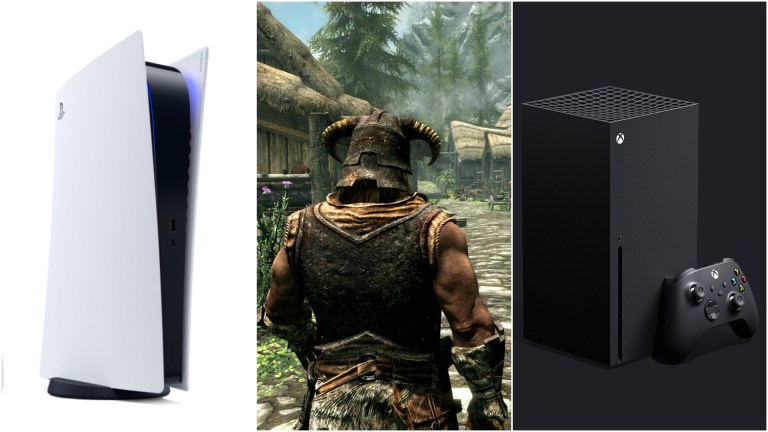How the Bethesda Deal Changes the Xbox Series X vs. PS5 Console War
PS5 or Xbox Series X? That question just became much more difficult to answer thanks to one of the biggest deals in gaming history.

Microsoft’s acquisition of ZeniMax Media, parent company of game publisher Bethesda Softworks and all of its prized studios, isn’t just one of the biggest deals ($7.5 billion) in the history of the industry. It’s an arrangement that could very well change the course of gaming as well as the outcome of the Xbox Series X vs. PS5 console war.
That may sound like an exaggeration. To be fair, we’ve already seen some people jump to incredible conclusions regarding the implications of this deal and how it will affect consumers in the coming years. Will Elder Scrolls 6 and Starfield be Xbox exclusives? Will Bethesda only make Xbox games going forward? Are PS5 users out of luck? As we noted elsewhere, the fact of the matter is that many of the specifics of this arrangement are up in the air and very much subject to change.
Yet, based solely on what we know for sure about this deal, it’s a near certainty that Microsoft’s acquisition of Bethesda could (and perhaps should) impact your decision to invest in the Xbox brand during the next generation. To better explain why that is the case, we’re going to examine a few of the immediate implications of this arrangement in terms of how they could impact which next-gen console you choose to buy.
Bethesda Immediately Increases the Value of Xbox Game Pass
The biggest immediate takeaway of the Bethesda/Xbox deal is the reveal that Microsoft intends to make major upcoming Bethesda releases day one additions to the Xbox Game Pass lineup. Specifically, Microsoft mentioned Bethesda’s upcoming sci-fi RPG Starfield as a title it plans to bring to Game Pass as soon as it’s released.
If that proves to be true, and if that philosophy holds, then that could also mean that The Elder Scrolls 6 will be available on Game Pass at launch as well. On top of all that, Microsoft has also confirmed that it’ll begin adding Bethesda’s back catalog of classic games to the Game Pass library.
Again, we’ll have to see how the specifics play out, but it’s pretty clear that Microsoft wants to add quite a bit of Bethesda content to Game Pass. At a time when the prospect of $70 video games threatens to impact the number of new games you get to play in a year, the idea of immediately being able to access major Bethesda games through your Game Pass subscription ($9.99 a month) on day one is a big deal.
This Deal Makes The Xbox Series S More Appealing
The idea of buying an Xbox Series S was always partially based on the value of being able to access Xbox Game Pass, xCloud, and select upcoming Microsoft exclusives at a relatively low price. The console’s reduced hardware capabilities raise questions about its long-term viability as a next-gen device, but as a delivery vehicle for Microsoft’s premier digital services, it certainly seems to be capable of getting the job done.
What this Bethesda deal really does, though, is help solidify Xbox Series S’s position as an ideal second (or even third) console for many gamers. On some level, Microsoft probably realizes that the PlayStation 5’s brand recognition, army of exclusives, and international foothold mean that many gamers will probably buy one sometime in the next few years. Analysts are already predicting a sizeable PS5 victory.
With this Bethesda deal, the idea of buying the slightly less powerful Xbox Series S simply to access Bethesda’s contributions to the Game Pass library suddenly feels a lot more appealing. The Xbox Series S may not become your “main” console, but we doubt its potential status as the “sometimes” console in your home upsets Microsoft.
The “Threat” of Bethesda Games Becoming Xbox Exclusives Looms Large
The truth is that nobody knows what the availability of future Bethesda games will be like. The official position on the matter is that existing exclusivity commitments (which include Ghostwire: Tokyo and Deathloop on PS5) will be honored by Microsoft. Beyond that, the release of future Bethesda games on third-party platforms will be determined “on a case-by-case basis.”
It’s safe to say that some fans are worried. If you own a next-gen Xbox or gaming PC, you’re going to be able to play most major Bethesda releases no problem. While it’s possible PS5 gamers will still be able to play The Elder Scrolls 6 and Starfield on their next-gen console, the truth is that the parties that can make such guarantees haven’t made them yet.
This all goes back to Microsoft increasing the value of the Xbox Series S (and Xbox Series X) not just through what we know the consoles will deliver in raw power, but through the idea that experiencing the best gaming has to offer may require you to own an Xbox platform.
Microsoft Changes The Conversation About What a Console War Winner Looks Like
At various points over the last few years, Microsoft representatives have made statements about how they’re looking beyond hardware sales in order to determine the success of the Xbox brand. Some wrote such statements off as the excuses of a company that had fallen far behind Sony in hardware sales.
Yet, as time goes on, it’s easy to see the truth in what Microsoft is talking about. Microsoft is betting big on the idea that the future of gaming is more about subscription services, cloud technology, and software sales across multiple platforms. Obviously, Microsoft would still love to sell 100 million Xbox Series X/S, but at a time when the standard hardware rotational cycle feels more arbitrary than ever before, Microsoft investing in things which could outlive a piece of hardware could chance how we measure a console manufacturer’s success in the long-term.
The old saying goes, “If you don’t like what’s being said, change the conversation.” Well, Microsoft was probably pretty tired of hearing about how the Xbox One had fallen far behind the PlayStation 4. Now, though, those in the know are forced to have a much more nuanced conversation about which company is doing better. At the very least, everyone seems to be talking about Microsoft and Xbox at this very moment.


